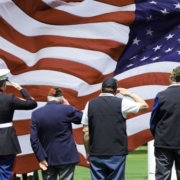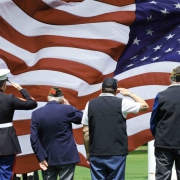Can VA Benefits Help Cover Long-Term Care?
It is a complicated matter for military veterans to use their Department of Veterans Affairs benefits to cover long-term care costs. An underused pension benefit known as Aid and Attendance can provide some money to cover costs for assistance performing everyday tasks. Aid and Attendance benefits may even be available to veterans with incomes above the eligibility limit if they have a large enough medical expense(s) for which they receive no reimbursement.
VA benefits also pay for those veterans without service-related disabilities but who cannot pay the cost for necessary care if their income level does not exceed eligibility requirements. Aid and Attendance as a pension benefit are available to those veterans who served a minimum of ninety days with at least one day during wartime. However, the veteran did not have to see actual combat. Find out about eligibility requirements here at the va.gov website. All VA benefits have a service requirement to qualify for long-term care, and the veteran applicant must have an honorable or general discharge to qualify for these benefits.
Typically, long-term care services occur in veterans’ home settings as care in facilities is limited due to availability, staffing issues, and an overall failure of the US long-term care marketplace to provide quality long-term facility care at reasonable prices. At-home care has two programs that help veterans.
What are Veteran Aid and Attendance Benefits?
The first, as mentioned, is Aid and Attendance Benefits (A&A Benefits) coupled with Housebound allowance. This program provides cash to eligible veterans with disabilities and their surviving spouses to purchase at-home and community-based services. These services include caregiver assistance and personal care. The cash is a supplement to existing eligible veterans’ pension benefits.
What is the Veteran Directed Care Program?
The second is the Veteran Directed Care Program, providing veterans with a flexible budget for purchasing services like counseling or other support provided by the Aging Network in partnership with the VA. The program is available to veterans of all ages who need at-home and community-based services in a consumer-directed way and provide help with daily living activities and more.
While not all long-term care provision is in a home setting, many veterans are most comfortable receiving aid in their own homes, mainly if a spouse or other family member is available for ad hoc caregiving. For those veterans who live alone, a nursing home, assisted living center, adult health center, or private homes where caregivers support a small group of veterans may be a better solution. Some of these facilities will be run directly by the VA, while others are VA-approved state or community organizations.
Long-term care services for qualifying sick or disabled veterans include:
- 24/7 nursing and medical care
- Help with activities of daily living (ADLs) such as bathing, personal care, dressing, taking medications, and making meals
- Pain management and comfort care
- Caregiver support
Planning for long-term care through VA benefits is a complex set of tasks. The most comprehensive and best solutions generally come from elder law attorneys who specialize in VA benefits. In addition to VA long-term care benefits, your attorney may be able to ensure additional services not covered by the VA but may be available through Medicare, Medicaid, or a private insurance policy. Your attorney also understands techniques of transferring wealth, including the three-year look-back rule and how it affects a veteran’s eligibility for VA long-term care benefits.
The Importance of Long-term Care Planning for Veterans
According to Forbes, many veterans miss out on long-term care benefits with a mere five percent application rate for the assistance funds because veterans are unaware of the programs. Knowing about the programs and if you qualify, locating the necessary paperwork, filling it out, and filing applications can be daunting. Incorrectly filed applications can delay the process of receiving benefits. VeteranAid.org is an online free resource for veterans and their surviving spouses and families. The website details A&A Pension Benefits and how to apply.
If you are a veteran or have a loved one who is a veteran, it is imperative to maximize all long-term care benefits due to them for their military service. The sooner you can identify what is available to you, the quicker you can fill out the applications and get the process of receiving VA long-term care benefits moving forward. As with all long-term planning, you will typically have a better outcome if you address the situation early. Please contact our Ruston, LA office by calling us at (318) 255-1760 or schedule an appointment to discuss the assistance funds that may be due to you for long-term care.


